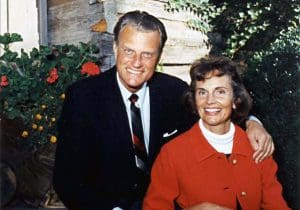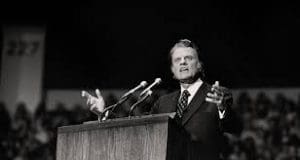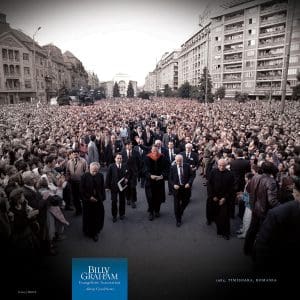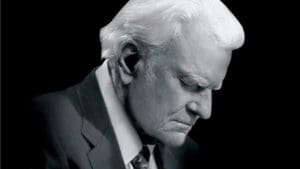By BosNewsLife News Center with reporting by Stefan J. Bos, Chief International Correspondent BosNewsLife and BGEA



WASHINGTON/BUDAPEST (BosNewsLife)– Billy Graham, the famed evangelist who became known as “America’s Pastor” and was a personal counselor to American presidents, has died at the age of 99, his family spokesman confirmed.
Graham, who preached “the Gospel of Jesus Christ” to millions of people around the world, died at his home Wednesday morning “from natural causes,” a statement said.
Born in 1918 in Charlotte, North Carolina, William Franklin Graham Jr. was the oldest of the four children of William and Morrow Graham.
He was raised on a dairy farm, and little in his childhood suggested he would become a world-renowned preacher.
Back then, “Billy Frank,” as he was called, preferred baseball to religion. “I detested going to church,” he said when recalling his youth.
But in 1934, that changed. At a revival led by traveling and outspoken evangelist Mordecai Fowler Ham, 15-year-old Graham committed his life to serving Jesus Christ. No one was more surprised than Graham himself.
OPPOSING EVANGELISM
“I was opposed to evangelism,” he said. “But finally, I was persuaded by a friend [to go to a meeting]…and the spirit of God began to speak to me as I went back night after night. One night, when the invitation was given to accept Jesus, I just said, ‘Lord, I’m going.’ I knew I was headed in a new direction.”

When the conservative Christian school’s strict doctrine didn’t align with his personal beliefs, he transferred to the Florida Bible Institute (now Trinity College of Florida) and joined a Southern Baptist Convention church.
He was ordained in 1939. Several years later, Graham’s “new direction” led him to the Florida Bible Institute (now Trinity College of Florida), and then, Wheaton College in suburban Chicago, where he met fellow student Ruth McCue Bell, the daughter of medical missionaries in China.
The couple graduated and married in the summer of 1943. Mr. and Mrs. Graham and their five children made their home in the mountains of North Carolina. They were married for 64 years before Ruth’s death in 2007.
After two years of traveling as a speaker for the Youth for Christ organization, Billy Graham held his first official evangelistic Crusade in 1947.
MASSIVE CRUSADE
But it was his 1949 Los Angeles Crusade that captured the nation’s attention. Originally scheduled to run for three weeks, the “tent meetings”  extended for a total of eight weeks as hundreds of thousands of men, women, and children gathered to hear Graham’s messages.
extended for a total of eight weeks as hundreds of thousands of men, women, and children gathered to hear Graham’s messages.
Soon after, Graham started the Billy Graham Evangelistic Association (BGEA) which was incorporated in 1950. Since 2000, Graham’s son, Franklin, has led the Charlotte-based organization, which employs some 500 people worldwide.
Billy Graham may be best known, however, for his evangelistic missions or “Crusades.” He believed God knew no borders or nationalities and preached to millions, often in stadiums and other large areas.
In a historic move in 1985, he preached in Hungary when the country was still part of the Soviet-led East Block. Thousands attended that gathering, including a young reporter, BosNewsLife founder Stefan J. Bos.
The next year Bos would interview him for left-leaning Radio Amsterdam during a turbulent time when squatters occupied real estates across the city, and riots threatened the fragile peace in the Dutch capital. “I received a call from one of his aids whether I would be ready to interview him the next day. Graham was in Amsterdam for ‘Amsterdam ’86’, the International Conference for Itinerant Evangelists with evangelists from every conceivable background. I was only 18 at the time but worked for several Dutch media,” Bos said.
In 30 seconds Graham could preach the Gospel, and it was used as a commercial by Radio Amsterdam to promote the interview. “My message to the people of Amsterdam is: God loves you. Christ died at the cross for your sins…”, Bos recalled him saying.
RETURNING TO HUNGARY
Three years later, in 1989, Bos met Graham when he returned to Hungary and spoke for more than 100,000 people in the country’s largest sports stadium. “Thousands came forward when asked whether they wanted to accept Jesus Christ as their “personal Lord and Savior,” Bos said.
(Story continues below video footage of Billy Graham’s visit to Budapest in 1989)
“Organizers were afraid they would storm the platform. The soccer field was packed with people.”
Graham came under pressure to speak about the persecuted ethnic Hungarians, including Christians, in neighboring Romania at the time. Graham declined, saying he was primarily a preacher of the Gospel.
Graham also managed to conduct preaching missions in virtually every other country of the former Eastern Bloc (including the Soviet Union), as well as Communist-run China and North Korea.
“Throughout his career, Graham also preached to millions in locations from Addis Ababa, Ethiopia to Zagorsk, Russia; and from Wellington, New Zealand to the National Cathedral in Washington,” the BGEA said in a statement.
CROWDED STADIUM
In 1973, Graham addressed more than one million people crowded into Yoido Plaza in Seoul, South Korea—the largest live audience of his Crusades, organizers said.

Graham spoke to people of all ethnicities, creeds, and backgrounds. Early in his career, he denounced racism when desegregation was not popular.
Before the U.S. Supreme Court banned discrimination on a racial basis, Graham held desegregated Crusades, even in the Deep South.
He declined invitations to speak in South Africa for 20 years, choosing instead to wait until the meetings could be integrated, according to staff members familiar with his thinking. Graham’s multi-ethnic campaign eventually occurred in South Africa in 1973. Preaching in Johannesburg, Graham said, “Christ belongs to all people. He belongs to the whole world.…I reject any creed based on hate…Christianity is not a white man’s religion, and don’t let anybody ever tell you that it’s white or black.”
As his message spread, Graham was granted personal audiences with royalty, dignitaries and many sitting U.S. presidents, from Harry S. Truman to Barack Obama.
WORLD MESSAGE
“While Graham’s primary focus was to take this message to the world, he also provided spiritual counsel to presidents, championed desegregation, and was a voice of hope and guidance in times of trial,” the BGEA said.
In 2001, he comforted his country and the world when he spoke at the National Cathedral in Washington, following the September 11 terrorist attacks that killed thousands.
At three global conferences held in Amsterdam (1983, 1986, 2000), Graham gathered some 23,000 evangelists from 208 countries and  territories to train them to carry the message of Jesus Christ around the world, according to BGEA estimates.
territories to train them to carry the message of Jesus Christ around the world, according to BGEA estimates.
During the week of his 95th birthday in 2013, Graham delivered his final message via more than 480 television stations across the U.S. and Canada.
More than 26,000 churches participated in this My Hope project, making it the Billy Graham Evangelistic Association’s most significant evangelistic outreach ever in North America.
MANY BOOKS
Graham authored 34 books, including his memoir, Just As I Am (Harper Collins, 1997), which remained on The New York Times best-seller list for 18 weeks.
In 1996, Graham and his wife, Ruth, received the Congressional Gold Medal, the highest award Congress can bestow on a private citizen. He was also listed by the Gallup opinion poll institute as one of the “Ten Most Admired Men” 61 times—including 55 consecutive years (except 1976, when the question was not asked).
 Graham was cited by the George Washington Carver Memorial Institute for his contributions to race relations and by the Anti-Defamation League of the B’nai B’rith.
Graham was cited by the George Washington Carver Memorial Institute for his contributions to race relations and by the Anti-Defamation League of the B’nai B’rith.
“Throughout his life, Graham was faithful to his calling, which will be captured in the inscription to be placed on his grave marker: ‘Preacher of the Gospel of the Lord Jesus Christ’,” the BGEA stressed.
“NEEDING FORGIVENESS”
“There were a few times when I thought I was dying, and I saw my whole life come before me…” explained Graham at his Cincinnati Crusade on June 24, 2002. “I didn’t say to the Lord, ‘I’m a preacher, and I’ve preached to many people.’ I said, ‘Oh Lord, I’m a sinner, and I still need Your forgiveness. I still need the cross.’ And I asked the Lord to give me peace in my heart, and He did—a wonderful peace that hasn’t left me.”
(Story continues after this message)
As his health declined, Graham retired in 2005. During the week of his 95th birthday in 2013, Graham delivered his final message via more than 480 television stations across the U.S. and Canada.
More than 26,000 churches participated in this My Hope project, making it the Billy Graham Evangelistic Association’s largest evangelistic outreach ever in North America, the BGEA said.
Billy Graham is survived by his sister Jean Ford; daughters Gigi, Anne and Ruth; sons Franklin and Ned; 19 grandchildren; and numerous great-grandchildren.
His wife, Ruth, died June 14, 2007, at age 87, and is buried at the Billy Graham Library. A private funeral service is planned at the Billy Graham Library, on a date to be announced, the BGEA said. Instead of flowers, memorial gifts may be made “to the ongoing ministry of evangelism at the Billy Graham Evangelistic Association, online at BillyGraham.org or via mail, sent to the Billy Graham Evangelistic Association, 1 Billy Graham Parkway, Charlotte, NC 28201,” the BGEA said.
Notes of remembrance can be posted at BillyGraham.org









